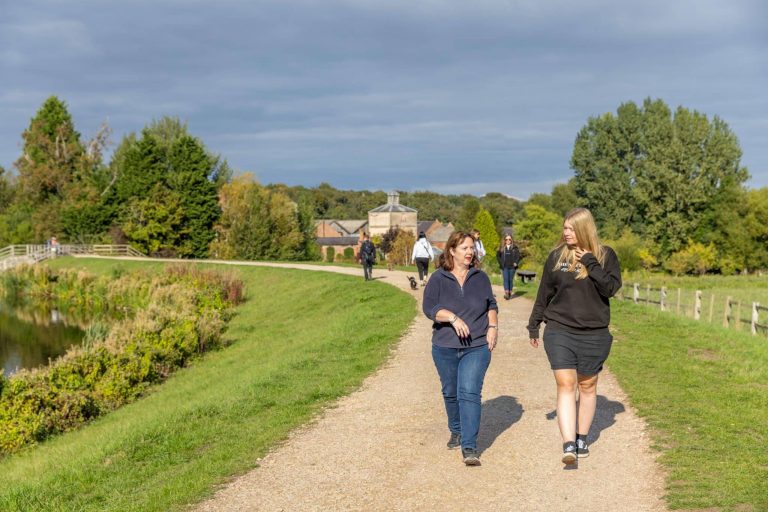2026 Business Predictions: Paul Tutin, chairman and managing partner, Streets
East Midlands authorities secure major boost for Active Travel investment
Local authorities across Derby, Derbyshire, Nottingham, and Nottinghamshire will receive more than £18 million to expand and upgrade Active Travel infrastructure, strengthening plans for walking, wheeling, and cycling across the region. The funding forms part of a wider national allocation aimed at improving sustainable transport and reducing pressure on local networks.
Active Travel England has released its 2025 capability ratings, which influence how much investment each authority receives. Nottingham City Council achieved the region’s highest score. Nottinghamshire and Derbyshire recorded improvements in their ratings, signalling progress in their developing active travel networks. Derby City Council received a lower score but remains eligible for support to advance future projects.
Mayor of the East Midlands, Claire Ward said: “This year’s Active Travel capability ratings show both the progress and the challenges across our region. With nearly £19m allocated to our region to support safer routes and improved walking, wheeling and cycling infrastructure, we now have a real opportunity to accelerate change. Our goal is to make active and sustainable travel options safer and more accessible for everyone. We also look forward to EMCCA receiving its own rating in 2027 as our regional approach continues to develop.”
The programme sits within a multi-year national funding package worth £626 million, first outlined in the Government’s Spending Review. The national plan aims to deliver 500 miles of new and upgraded walking and cycling routes and increase the number of low-carbon local journeys made each day. The initiative is designed to support public health goals, reduce congestion, and enhance economic resilience.
Alongside the funding release, regional leaders are gathering views on long-term transport priorities as part of an ongoing consultation to improve connectivity across the East Midlands.
Japanese firms assess UK collaboration opportunities at Leicester space hub
Japanese space technology companies have visited Space Park Leicester to assess potential partnerships with UK organisations. The delegation, made up of seven early-stage firms, travelled to the University of Leicester’s £100 million research and innovation hub as part of a wider push to build commercial links in Europe.
The visit formed part of the J-StarX SpaceTech Acceleration Programme, which aims to connect Japanese firms with businesses in the UK and France. Both markets remain central to Europe’s space sector due to their mix of commercial operators, academic institutions, and deep supply chains.
The companies represented a broad range of specialisms, including synthetic diamonds for advanced sensing, satellite-led land evaluation, microgravity research spacecraft, debris-mitigation devices, hybrid propulsion, high-performance insulation materials, and mission operations support. Each organisation is seeking routes into European programmes and opportunities for applied research and industry partnerships.
Vinay Patel, Head of Commercial and Innovation at Space Park Leicester, said: “This was a great opportunity for organisations here to develop international relationships with a variety of innovative Japanese space companies.
“One of our visitors acts as a one-stop shop for space operations, providing the tools, processes and training needed to ensure space missions are successful in the most demanding environments.
“Others are working on innovations that will support the sustainable growth of the space industry and technologies that are helping to drive the sector forward.
“It was great to see fantastic companies from the UK and Japan showcasing their work and discussing potential areas of collaboration for the future.”
Alongside formal meetings, the group toured Space Park Leicester’s laboratories and engineering facilities to understand the centre’s technical capability.
The J-StarX programme is delivered by Starburst and the Japan External Trade Organisation in partnership with Japan’s national space agency. It is designed to accelerate international market entry for Japanese companies and encourage cooperation in next-generation space technologies.
Neighbourhood of 200 affordable homes set for Boston
Stockyard redevelopment project advances with design enhancements
- The Anchor Building – A gateway to the site, offering flexible, fully fitted floors with potential spaces for educational purposes or artisan businesses and food producers. The top floor will become an event space for conferences and celebrations, with scope for workshops or training sessions to support skills development.
- Nottingham Road Studios – Four modern, energy-efficient units designed for creative industries and start-ups, fully equipped for immediate use.
- Trader Hall – A revitalised food and market hall with weather protection, perfect for markets and pop-up food experiences.
- Production Hubs 1 and 2 – Professional spaces for food and drink production businesses to grow, complete with heating, accessible facilities, and expansion options.
- The Square – An outdoor event space with “plug and play” infrastructure for festivals, performances, and cultural activities.
- Banqueting Suite and Exhibition Hall – To be developed into a Cultural Hub designed for educational activities, performances, exhibitions and conferences.
- Changing Places Facility – The location of this facility has been relocated to a more central and inclusive position, with additional improvements to an increased number of toilet facilities onsite.
Cham Kang takes up Chamber presidency as leadership team reshaped
East Midlands Chamber has confirmed a refreshed leadership team at its annual meeting in Leicester. Cham Kang has begun his term as President, taking over from Dawn Whitemore as members reviewed a year of activity and priorities for the region’s business community.
Speaking after the AGM, East Midlands Chamber New President Dr Cham Kang said: “I’m absolutely delighted to be President of East Midlands Chamber. As a region we have got a lot of history. We’ve got brilliant businesses and we are a fantastic region for all aspects of business and a strong community.
“I think the one thing we need is confidence. It’s been a couple of difficult years, particularly last year, and I think we need to build momentum by talking each other up, helping each other to support each other. Let’s build that confidence, let’s build that self-belief, let’s evolve, let’s collaborate – so we can all grow together and our region grows as a result.
“I’m feeling really positive about 2026 because I think the language is starting to change. I think at the last Budget, everyone was a bit nervous. It was difficult but it not as bad as people had anticipated. Now it’s very important that we start to be optimistic and start doing the things that we need to, for successful business in a successful region.”
The AGM confirmed several new appointments. Mark Deakin will serve as Vice-President. Eileen Perry MBE DL has taken the role of Vice-Chair. Preethi Kang has been named incoming Chair of Generation Next, the Chamber’s network for young professionals.
Members also approved board changes. Richard Cohen, Stephen Grubb, Tom Morgan and Becky Rix have joined the Board of Directors. Emma Baumback has been re-elected for another term.
Heanor’s former Science Block enters feasibility phase
Work has begun to determine the commercial potential of Heanor’s long-vacant former Science Block as Amber Valley Borough Council commissions a full feasibility study for the site.
The UK Shared Prosperity Fund funds the project and focuses on identifying realistic redevelopment options for the building, which sits on the former Heanor Grammar School grounds.
The council has appointed GSS Architecture to lead the assessment, with consultancy support from MGAC. Their remit covers market testing, investment modelling, and a review of viable end uses that could support regeneration efforts in the town centre.
The first phase includes structured engagement with residents, community group,s and businesses. A public drop-in event is scheduled for 18 December at St Lawrence Church, and an online consultation will run until 5 January. A separate stakeholder session will take place on 16 December for organisations with a direct interest in the site’s future.
Feedback from these channels will inform a shortlist of up to five options. These will be evaluated in early 2026 using the Government’s Five Case Business Model, covering strategic alignment, economic return, commercial viability, financial implications, and deliverability. The outputs will support future funding submissions and guide the next stage of redevelopment planning.
The study marks a key step in Heanor’s ongoing regeneration programme and follows recent investment activity at the neighbouring Grammar site.
Digital Planning strengthens regional presence with new Chamber partnership
Digital Planning has entered a strategic partnership with East Midlands Chamber, giving the Loughborough-based firm a formal platform to engage with the region’s business community and contribute to policy conversations that shape the local operating environment.
The collaboration enables the company to work more closely with member organisations, share technical expertise at Chamber events, and support initiatives focused on digital adoption.
East Midlands Chamber Chief Executive Scott Knowles said: “With rapidly evolving technology and the enormous opportunities presented by AI, Digital Planning is a valuable resource for East Midlands firms looking to streamline their processes or move their digital journey forward.
“I’m delighted to welcome Digital Planning as a strategic partner and I’m certain the insight brought will be highly beneficial to the Chamber and our members.”
Digital Planning works as a commercial R&D partner for mid-sized organisations operating in complex or regulated industries. Its portfolio covers secure automation, bespoke software, and cyber-resilient digital platforms for sectors including healthcare, manufacturing and financial services.
The firm collaborates with financial, scientific and international research institutions and is currently developing Metis, an AI system for contextual resource allocation.
Digital Planning Co-founder Mark Underwood said: “Digital Planning is really pleased to be partnering with East Midlands Chamber as we work together on the commercial R&D needed to transform productivity through original digital technologies.
“Digital Planning researches, develops, and delivers secure, next generation digital solutions that lift productivity, slash waste, and free people up to focus on higher-value work.
“Our partnership with the Chamber is already producing a really interesting bit of IP, and it’s deepening our role as a technology partner in complex and regulated industries aiming to confidently deploy next generation tech platforms.”
The company has gained regional recognition for its innovation, having won the 2025 Made in the Midlands Digital Technology Award and earned a shortlist position in a national entrepreneurship awards programme for its work in automation and data-driven technology.












